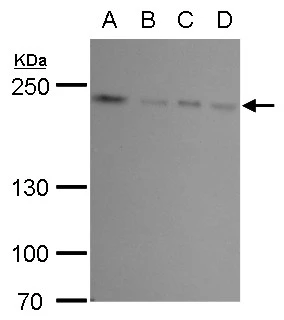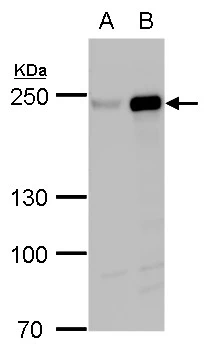
FIP200 antibody detects FIP200 protein by western blot analysis. A. 30 μg 293T whole cell lysate/extract B. 30 μg whole cell lysate/extract of human FIP200-transfected 293T cells 5 % SDS-PAGE FIP200 antibody (GTX129093) dilution: 1:5000
FIP200 antibody
GTX129093
ApplicationsImmunoFluorescence, Western Blot, ImmunoCytoChemistry, ImmunoHistoChemistry, ImmunoHistoChemistry Paraffin
Product group Antibodies
ReactivityHuman
TargetRB1CC1
Overview
- SupplierGeneTex
- Product NameFIP200 antibody
- Delivery Days Customer9
- Application Supplier NoteWB: 1:1000-1:10000. ICC/IF: 1:100-1:1000. *Optimal dilutions/concentrations should be determined by the researcher.Not tested in other applications.
- ApplicationsImmunoFluorescence, Western Blot, ImmunoCytoChemistry, ImmunoHistoChemistry, ImmunoHistoChemistry Paraffin
- CertificationResearch Use Only
- ClonalityPolyclonal
- Concentration1 mg/ml
- ConjugateUnconjugated
- Gene ID9821
- Target nameRB1CC1
- Target descriptionRB1 inducible coiled-coil 1
- Target synonymsATG17, CC1, FIP200, PPP1R131, RB1-inducible coiled-coil protein 1, 200 kDa FAK family kinase-interacting protein, FAK family kinase-interacting protein of 200 kDa, phosphatase 1, regulatory subunit 131
- HostRabbit
- IsotypeIgG
- Protein IDQ8TDY2
- Protein NameRB1-inducible coiled-coil protein 1
- Scientific DescriptionThe protein encoded by this gene interacts with signaling pathways to coordinately regulate cell growth, cell proliferation, apoptosis, autophagy, and cell migration. This tumor suppressor also enhances retinoblastoma 1 gene expression in cancer cells. Alternative splicing results in multiple transcript variants encoding distinct isoforms. [provided by RefSeq, Nov 2009]
- ReactivityHuman
- Storage Instruction-20°C or -80°C,2°C to 8°C
- UNSPSC41116161

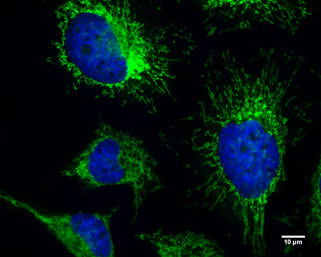
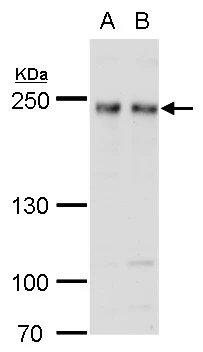
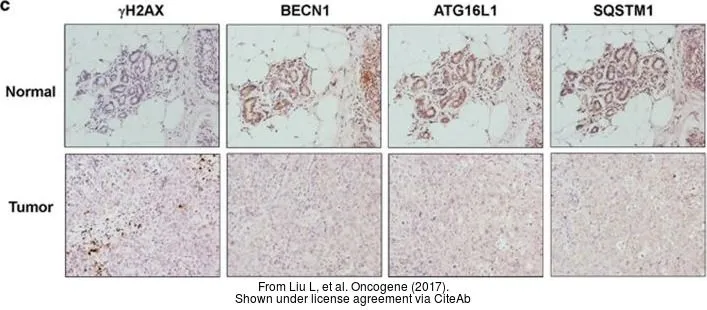
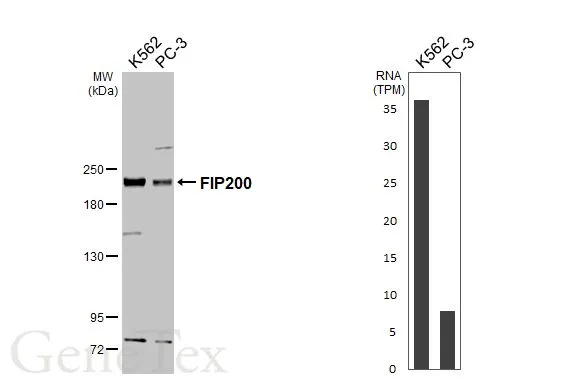


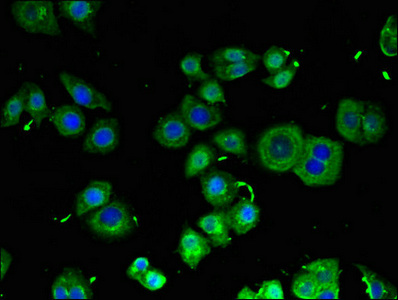

![Mouse tissue extract (50 μg) was separated by 5% SDS-PAGE, and the membrane was blotted with FIP200 antibody [N1N2], N-term (GTX107387) diluted at 1:500.](https://www.genetex.com/upload/website/prouct_img/normal/GTX107387/GTX107387_39939_20160204_WB_M_muscle_w_23060120_355.webp)
